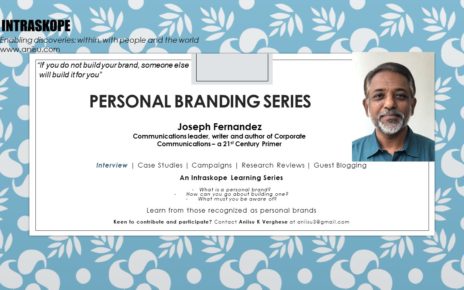If you are thinking of building your personal brand or are already in the journey of creating one, the following questions may be on your mind.
· How can I be known for my knowledge and expertise?
· What must I do to discover my unique promise?
· Is personal branding only applicable for celebrities?
· If employees have personal brands, will they be as committed to the workplace?
· Is personal branding about social media?
· How do I know if my personal brand is recognized?
Such questions often bother those wanting to carve a niche for themselves at work, in their business or while seeking jobs right after college. Often, employers feel threatened when their employees – for example, are updating their social media profiles, participating in community engagements or speaking at industry events.
Each of us, like it or not, are already personal brands. Just that we probably don’t know enough about what our brand stands for or are unsure how to further strengthen and improve it. Using simple, yet powerful formulas you can find a way to differentiate yourself in a highly competitive world. Before, we get deeper into the subject; it always helps to understand trends that are shaping the world around us and what they mean for personal branding and you.
Trends shaping the world of business and society
The impact of technology on business and society is real. Automation is no more a buzzword. According to a study by McKinsey Global Institute, about 60% of jobs globally have at least 30% of automatable activities. Predictable physical activities, collecting and processing data are some aspects of work that can get automated, putting many jobs at risk. However, while automation progresses, three types of work will continue to thrive – those that involve creating, composing and coaching. We already see a surge in such needs. Look around you – you can see creators of unique and specialized products and services to aggregators and personalized coaches for wellness and other themes.
There is a rise in individualism worldwide as we become a ‘me’ society. According to a study, individualism has increased by about 12% since 1960. This is due to global socio-economic changes, work preferences, urbanization, and higher incomes among other factors. It is also heartening to see that individualism has led to more altruism. Independent workers are increasing globally. Based on choice, necessity and relationships with the employer, independent workers have more autonomy, flexibility and are able to control their lives more than ever.
On the organizational front, employers are shifting to on-demand hiring to manage these changes in the talent landscape. Organizations are investing in re-designing themselves for the future, with 96% surveyed in a recent global talent study by Mercer indicating they were streamlining structures to be more agile. The demand for core work skills is evolving – problem solving, social and system skills are the need of the hour. These changes mean that employees have to adapt quickly and reskill themselves to stay relevant. In a PwC study on the future workforce, 74% of those surveyed were ready to learn new skills or completely retrain in order to remain employable in the future.
These demands aren’t matched as much in terms of pace and commitment within organizations. Global talent trends indicate that, while 51% of staff demand flexibility at work, just 15% of C-suite believe that upskilling or retraining will make significant business impact on their organizations. Also, just 3 in 10 are investing in equipping their employees to be ready for the future. Peoples’ trust in government, media and NGOs among other bodies is eroding. People trust their peers – ‘people like us’ as credible spokespersons. There are also reports of governments monitoring trust-breaking behaviors, giving ‘social’ scoresto citizens and imposing penalties. The above trends covers the ‘why’ of personal branding and throws light on the challenges individuals face to stay relevant in a constantly changing world.
The relevance of personal branding
You can’t afford to take your careers or your businesses for granted. This therefore leaves individuals little option but to invest in their own personal brands. The need for personal branding can’t be more pronounced today. Personal branding is considering a form of marketing, self-promotion or an expression of individualism. It expects the person to reflect and draw on strengths and offer unique value to others around them. While in any capacity – as a student, professional, entrepreneur or a retired worker, there are opportunities to be your authentic self and make a difference to the world around you. Organizations are realizing the potential of staff as personal brands. Earlier, organizations used to balk when employees posted on social media or spoke at conferences in their personal capacity. Some firms continue to ban social media at work or control what and how employees engage externally.
In some sense, organizations are an amalgamation of personal brands.Today, progressive organizations want employees to have their own brands and hope the trade-off helps build their brand. Also, with personal and corporate brands overlapping, organizations are realizing the value of engaging staff as influencers. For an individual, it matters most to be visible within the organization and outside. With fierce competition, evolving business and societal changes taking place, unless you stand out from the crowd you will lose out in the end. Often we gauge the credibility and trustworthiness of individuals at first glance; there is a need for a professionalized manner of presenting your best and authentic self.
The perception people have about you – is your brand. Like the way organizations are reviewed online on Glassdoor by prospective candidates, you are gauged by your impression online and offline. Online presence includes your social media profiles and the imagery and content you portray. Be it your photo archive, blog, publications, videos among others. The growth of online reputation management tools tell us how important image is for people. Offline presence is about you engaging in forums, interacting with people and contributing to the community.
Making your personal brand come alive
According to me, there are three key elements of a personal brand – the ‘what’ – passion, proficiency and positioning. Passion is about recognizing what you believe in and how committed you are to your purpose. It can be about a specific profession or role you enjoy or a business idea you want to bring to life. Even if you are a student, you have the opportunity to demonstrate your affiliation, construct a compelling portfolio and convey your value. Proficiency relates to how strongly you have developed and contributed to your area of expertise. To a point where you are the go-to person, each time the need arises to perform the highest standards. Ask yourself – can anyone come close to my capabilities and expertise? Positioning related to how well you pitch yourself to the world around you. When you have discovered the gap and found a niche, which you claim as your own, you are heading in the right direction.
As you begin your journey as a personal brand, you need to first ‘fit-in’ in the domain or role that you are keen to excel. When you internalize and express yourself in your domain you are gaining credibility in your peer circle. It may sound counter-intuitive that you need to ‘fit-in’ to stand apart. However, to differentiate yourself, first establish your credibility by demonstrating your expertise in the domain. That sets you up to strike out as unique by gathering positive impressions, making significant contributions and building your social net worth. You cannot be a rank-outsider and yet be ‘known’ for your worth.
Personal branding is not about you – it about the other. Don’t let your ego come in the way. If the focus is about what you benefit, you are doing yourself a disservice. Authenticity and personalization are key aspects of building your personal brand. The more you specialize and offer unique experiences to people and organizations around you, the more the ‘goodness’ that comes around. The other point to understand is that personal brands are always about engaging from the inside out. Any attempt to overtly brand from the ‘outside in’ can result in mismatched expectations. When you are able to balance external and internal validations, you are on the right track to building your personal brand.
Establishing a personal brand takes time – it doesn’t occur overnight. I believe, the journey takes places in three phases – the ‘how’ – building expertise, adding value and reinventing yourself. These interrelated phases are linked to the themes of clarity, commitment and consistency. The Effective communication underscores this model. You can’t add value unless you build expertise. Likewise, you can’t reinvent when you haven’t built sufficient credibility and added sufficient value to people around you.
While building your personal brand, you also need to be conscious of managing perceptions of your image and the channels you use. From how you communicate to the approaches you take to engage with people; from the decisions you make to the worldview you adopt; from how you develop yourself and others around you to the actions you take to progress in your life – all of these add up and make a difference. Most importantly, what you also avoid doing to erode credibility matters while building your personal brand.
In summary, everyone has a personal brand – be it positive, negative or neutral. You don’t need to be a wealthy celebrity with a public relations team to manage an image and build a personal brand. You can also build yours by staying grounded, building your worth and aligning your actions with your values. How you shape your brand depends on the effort you put in and application you have in appreciating the world around you, understanding yourself, creating a thoughtful plan and consistently acting on your commitments – over time.
Keen to know where you are in your journey as a personal brand? Take this simple Personal Branding Assessment now! If you want to discuss your personal brand with me, write to me at [email protected]
I recently had the opportunity to participate in Indian Institute of Management (Bangalore)’s Forum for Dialogue webinar series. This article is a summary of my presentation.



